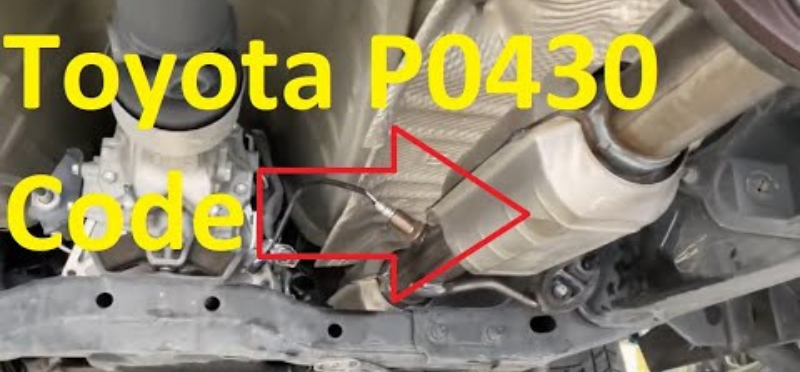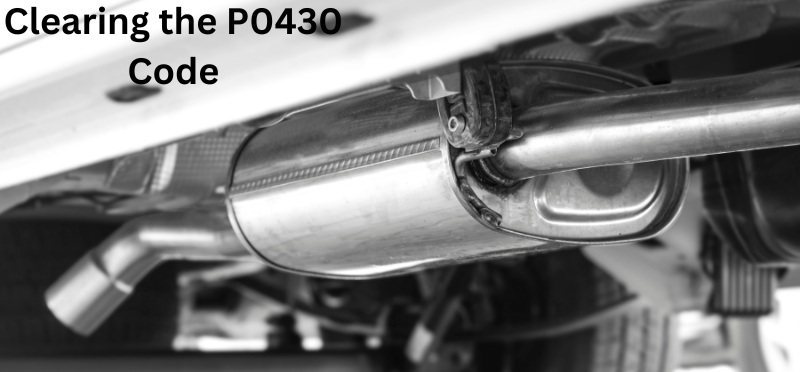When your car’s check engine light comes on, it can be concerning, especially when the diagnostic trouble code (DTC) reads as P0430. This code specifically relates to the efficiency of the catalytic converter in the exhaust system. Understanding P0430 Code means, its potential causes, symptoms, and possible solutions is crucial to address the issue effectively.
What is the P0430 Code?
P0430 is a diagnostic trouble code that indicates a potential issue with the catalytic converter in the exhaust system of a vehicle. It specifically points to inefficiency in the catalytic converter for Bank 2. The catalytic converter’s primary role is to reduce harmful emissions by converting pollutants into less harmful gases.

Causes of P0430 Code:
- Catalytic Converter Failure: Over time, the catalytic converter can degrade or fail due to internal or external damage.
- Oxygen Sensor Malfunction: Faulty oxygen sensors may provide inaccurate readings, leading to incorrect fuel-air mixture and affecting the catalytic converter’s performance.
- Exhaust Leaks: Leaks in the exhaust system before the catalytic converter can cause incorrect sensor readings and trigger the P0430 code.
- Engine Misfires: Continuous engine misfires can result in unburnt fuel reaching the catalytic converter, affecting its efficiency.
- Fuel Injector Issues: Malfunctioning fuel injectors can disrupt the air-fuel ratio, impacting the converter’s operation.

Symptoms of P0430 Code:
- Check Engine Light: The primary indicator of a P0430 code is the illumination of the check engine light on the dashboard.
- Reduced Engine Performance: Decreased power or acceleration may be noticeable due to improper fuel-air mixture.
- Increased Emissions: A failed catalytic converter can lead to higher emissions, which may fail emissions tests.
Read more- “Forged in Darkness: Unveiling the Secrets of Nightborne Armor’s Fortitude” | spend-bill-gates-moneys-strategies
Solutions :
- Diagnosis: A comprehensive diagnostic scan should be performed to confirm the P0430 code and identify potential underlying issues.
- Inspect Catalytic Converter: Check for physical damage, clogs, or overheating of the catalytic converter.
- Test Oxygen Sensors: Verify the functionality of oxygen sensors to ensure accurate readings.
- Exhaust System Inspection: Look for leaks or damage in the exhaust system that could affect the catalytic converter’s efficiency.
- Address Engine Misfires: Resolve any engine misfire issues and ensure proper functioning of fuel injectors.
- Replace Catalytic Converter: If necessary, replace the catalytic converter with a new, compatible unit.

FAQ
Q: Can I drive with a P0430 code?
A: It’s generally safe to drive with the P0430 code, but it’s advisable to address it promptly to prevent further damage to the vehicle and ensure it meets emission standards.
Q: How much does it cost to fix a P0430 code?
A: The cost can vary significantly based on the root cause. Repair costs range from replacing oxygen sensors (a few hundred dollars) to replacing the catalytic converter (can exceed a thousand dollars).
Q: Will resetting the code make it go away permanently?
A: Resetting the code may temporarily turn off the check engine light, but if the underlying issue persists, the code will likely reappear.
Q: Can a bad spark plug cause the P0430 code?
A: Yes, a faulty spark plug can cause engine misfires, leading to unburnt fuel reaching the catalytic converter and triggering the P0430 code.
Conclusion
The P0430 code, indicating a potential issue with the catalytic converter system in a vehicle, demands attention and prompt action. Ignoring this code can lead to decreased fuel efficiency, increased emissions, and potentially costly repairs down the line. In conclusion, addressing the underlying cause of the P0430 code is crucial for maintaining the performance and longevity of the vehicle, as well as minimizing its environmental impact. Whether it’s replacing a faulty catalytic converter or addressing related issues such as oxygen sensor malfunctions, taking proactive measures to resolve the P0430 code is essential for ensuring the continued reliability and efficiency of the vehicle.
